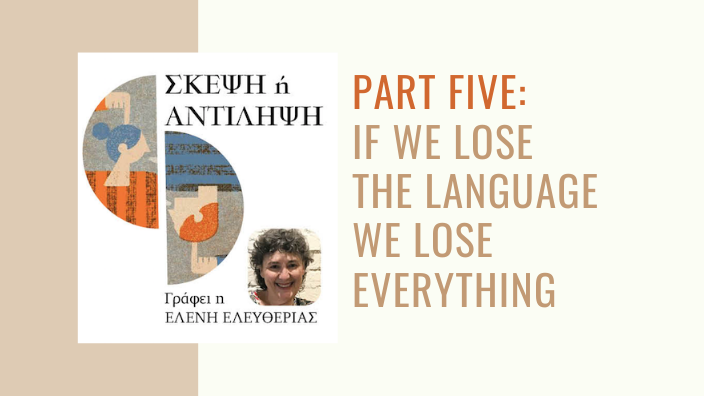By Eleni Elefterias
(PART 5)
Should we teach our children the Greek Alphabet?
Many parents stock up on Greek Alphabet books even before their toddler starts to walk. The intention is good but it is fraught with error.
Children in Greece learn Greek long before they start school. Even when they are babies sitting in their prams being pushed around by their parents they start to recognise street signs, shop signs, words on packaging etc.
They hear Greek all around them, on the bus, on the train, in the bank, at the park. By the time they go to pre-school they already recognise many words, realise that that letters in a row have meaning, and can speak quite fluently already.
In contrast, children of Greek background born here will not see Greek signs anywhere or hear Greek anywhere except either at home (some not even there) or at grandma’s house and rarely at Greek events. They rarely get to use their limited Greek language skills outside of their immediate family situation. There are no incidental learning opportunities at the shops or at the bank like the children in Greece.
Therefore, when they start preschool or Yr 1 at Greek afternoon school they are not starting on a level playing field with those from overseas. So why should we treat them as if they are? Why do we want to make them feel inadequate, when in fact they have more skills, being bilingual at such a young age?
Pre-schoolers in Greece are ready to deconstruct words and learn the alphabet. Our children are not.
They need to first get the basics, such as to learn the “tags”; words as signs. They need to recognise their name in Greek, their friend’s names, their favourite animals and toys through pictures with words attached.
Only once they have mastered the notion will they be ready to learn the letters these words are made of. Once they are at this stage they will fly. Don’t slow your child down by teaching them abstract, unnecessary characters that have no meaning for them.
So what does have meaning? Continued next week!
READ MORE: Insight or Perspective: If we lose the language we lose everything (Part Four)
*Eleni Elefterias-Kostakidis is a teacher of Modern Greek and University lecturer.

Read Eleni Elefterias’ column ‘Insight or Perspective’ in Greek, every Saturday in The Greek Herald’s print edition or get your subscription here.

